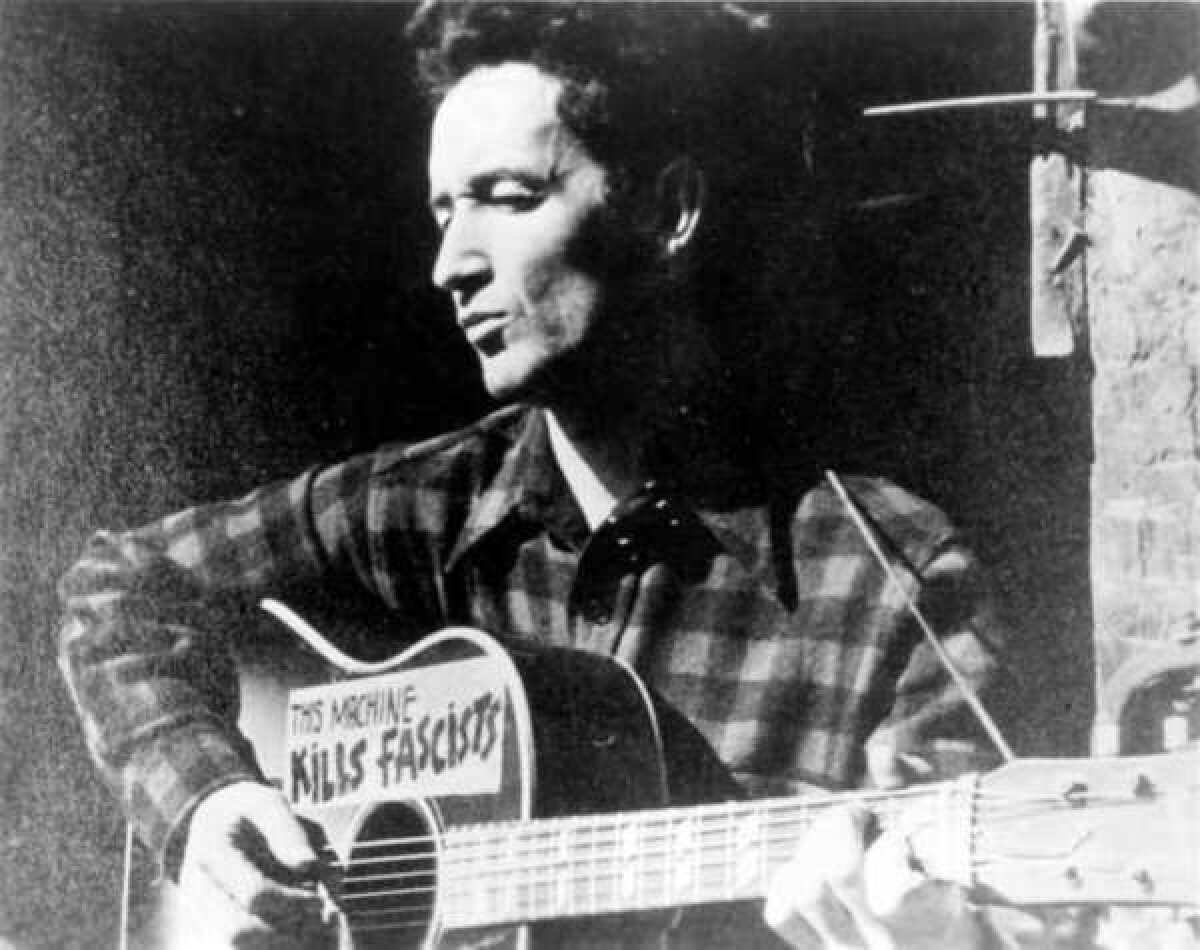‘Woody at 100’ celebrates legacy of Woody Guthrie

A long-held tenet of the Woody Guthrie story is that America’s greatest folk singer and songwriter turned pointedly political in his music after he moved to New York in 1940 and fell in with the left-leaning East Coast folk community.
But several recently discovered recordings by the man widely regarded as the father of folk protest music, made while he was knocking around Los Angeles in the mid- to late 1930s -- well before he got to New York -- are helping to shift that view. The songs have surfaced for the first time on “Woody at 100,” a new career-spanning three-CD box set that was released Tuesday by Smithsonian Folkways Recordings.
The four tracks, among the highlights of a new set that includes 57 Guthrie tracks, 21 of which had never previously been issued, constitute “The Los Angeles Recordings,” only rediscovered in the last decade. They predate his famous 1940 sessions at the Library of Congress in Washington, D.C., made at the behest of Moses Asch, a New York folk music enthusiast and record label owner.
Beyond altering the timeline of Guthrie’s known recording history, they open up new perspectives on the evolution of his writing.
“The four songs give us a glimpse into Woody as a songwriter during a period in which he was making a dramatic shift,” Peter LaChapelle writes in one of the essays in the accompanying 150-page book.
That book also includes dozens of Guthrie’s sketches, photographs, typed and hand-written lyrics, correspondence and articles about him by “Woody at 100” set producers and annotators Robert Santelli, executive director of the Grammy Museum, and Jeff Place, archivist for the Smithsonian Center for Folklife and Cultural Heritage.
LaChapelle, author of “Proud to Be an Okie: Cultural Politics, Country Music, and Migration to Southern California,” writes: “I contend in my book that Los Angeles, not New York, appears to be the place which drew Guthrie into politics.”
LaChapelle details his discovery of these tracks on two 78 rpm discs residing in obscurity in the Southern California Library for Social Studies and Research in South Central L.A. They’d been donated long ago to the library along with other old records by longtime L.A./Hollywood political activist Harry Hay, who met Guthrie through their mutual friend, actor Will Geer.
Two of those songs are “Skid Row Serenade,” which Guthrie wrote after spending time among the homeless along Hollywood’s skid row, and “Them Big City Ways,” in which he sings about how people become corrupted in moving from agrarian to metropolitan surroundings. The latter can be heard here.
“Guthrie was well-versed on conditions on Hollywood Boulevard,” LaChappelle writes, “having published columns in the Hollywood Tribune describing skid rows on both Fifth Street [downtown] and Hollywood Boulevard in 1939.”
The other two, “Do Re Mi” and “I Ain’t Got No Home (In This World Anymore),” became two of his best-known songs about inequities between society’s haves and have-nots, an injustice he returned to repeatedly in his music.
“Woody at 100,” which celebrates the centennial of his birth on July 14, 1912, in Okemah, Okla., opens with Guthrie’s best-known composition, “This Land Is Your Land,” and encompasses most of his cornerstone songs -- “Pastures of Plenty,” “Pretty Boy Floyd,” “Hobo’s Lullaby,” “Hard Travelin’,” “The Sinking of the Reuben James,” “So Long, It’s Been Good to Know You” -- along with less frequently recorded numbers such as “A Dollar Down and a Dollar a Week,” “The Ranger’s Command” and “Farmer-Labor Train.”
The third disc contains several radio broadcasts from stations in New York and the BBC in London that feature snippets of Guthrie introducing songs or otherwise discussing his music in illuminating ways.
A copy of the second page of his “Tom Joad” lyrics includes this explanatory note: “I wrote this song one night in New York. It was the night that I saw the moving picture, ‘The Grapes of Wrath,’ by John Steinbeck. If I could only think of the name of the friend that lived in that apartment, I would sure like to say thank you. You are friendly and wine is good.”
During performances, Guthrie’s son, Arlo, has been sharing the story of the letter his father got from Steinbeck after the author heard “Tom Joad.”
“He wrote, ‘You little bastard, how could you say in a few verses what it took me an entire novel to say?’ ”
Steinbeck returned the favor in a piece he wrote later describing Guthrie’s astonishing output from the late 1930s to the early ’50s, before Huntington’s disease largely robbed him of his artistic gifts. Guthrie wrote some 3,000 songs, the autobiographical novel “Bound for Glory,” newspaper columns, essays and poems, along with a voluminous number of sketches, paintings, drawings and other visual art works.
“Woody is just Woody,” Steinbeck once wrote. “Thousands of people do not know he has any other name. He is just a voice and a guitar. He sings the songs of a people and I suspect that he is, in a way, that people. Harsh voiced and nasal, his guitar hanging like a tire iron on a rusty rim, there is nothing sweet about Woody, and there is nothing sweet about the songs he sings. But there is something more important for those who will listen. There is the will of a people to endure and fight against oppression. I think we call this the American spirit.”
ALSO:
This year, this land will be Woody Guthrie’s
Woody Guthrie is celebrated with a concert in Tulsa, Okla.
When Woody Guthrie’s ‘This Land Is Your Land’ went to school
More to Read
The biggest entertainment stories
Get our big stories about Hollywood, film, television, music, arts, culture and more right in your inbox as soon as they publish.
You may occasionally receive promotional content from the Los Angeles Times.










